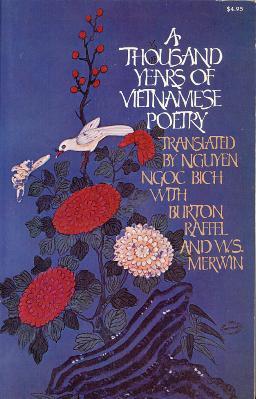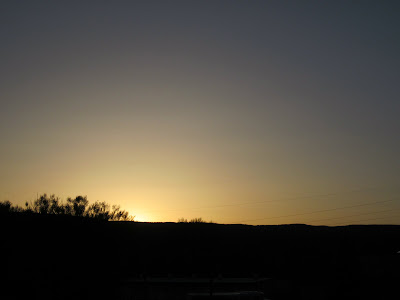Poetry Anthologies
April is National Poetry Month. Now that the month is almost over, I ought to mention something about it.
I love poetry anthologies, mostly for their element of surprise. You never know who you'll find in them, or which poem will be your new favorite (because the book isn't usually named after it). Some have themes, like love, or a certain author, or cultural tradition. Some anthologies are mostly terrible. But I believe that as long as an anthology introduces me to at least one great new poem or author, it's done its job.

A Thousand Years of Vietnamese Poetry (tr. Nguyen Ngoc Bich) is one such anthology. I discovered it at a used bookstore in downtown Eau Claire, which may or may not yet exist. The poems and poets provide an intriguing view of Vietnamese history, culture, and folklore. My favorite poem is an excerpt from "Sorrows of an Abandoned Queen" by Nguyen Gia Thieu. Speaking of her prince, the queen laments:
And oh, within the screens, his awesome majesty shone
and every moment was bliss.
Gold coins by the thousands
would not buy a spring dream by his side.
Now I wander in cinnamon walls
through the night's five watches, gradually despairing.
In night rain at the Moon-waiting Pavilion I pace,
toss through the dark hours on the Cool Wind Terrace.
Copper-cold are the inner rooms,
smashed the phoenix mirror,
shredded the bonds of love.
I wander in a dull dream,
my mind is lost.
This book may have been my first solid introduction to poetry in translation, which now fascinates me. I love the different cadence and phrasings English has, when it has the imprint of another language upon it. Pablo Neruda is another translated author I love, whose work sometimes has such an imprint.
Perhaps one of my favorite examples of a surprise bit of awesome in an anthology is "Little Elegy" by Keith Althaus. I found this poem in Poetry Daily (ed. Boller, Selby, and Yost), a book we used in a college English course.
Even the stars wear out.
Their great engines fail.
The unapproachable roar
and heat subside.
And the wind blows across
The hole in the sky
with a noise like a boy
playing on an empty bottle.
It is an owl, or a train.
You hear it underground.
Where the worms live
that can be cut in half
and start over
again and again.
Their hearts must be
in two places at once, like mine.
I particularly love this poem because I discovered it right after Spousal Unit, then simply a love interest, had taken off for a semester in France. I yearned, I longed, I pined for him in his absence, and this poem described that feeling perfectly - even then, before we were together, I knew something wonderful was waiting for us. (Cue collective groan at the overabundance of sap.)

I picked up Poets Against the War (ed. Sam Hamill) in 2004, and I loved how it mixed famous poets like Lawrence Ferlinghetti with people who'd never published a book in their lives. These poems cry love for America, while begging everyone to listen, as Lucille Clifton does with "stones and bones."
here is a country where old men
gather in the capital and
speak their language filled with
stones
their syllables are chips of bone
they speak of lifting up a creed
while cold and still there under
their tongue is somebody else's child
or mine
bones and stones
our ears bleed
red and white and blue

Garrison Keillor has been a favorite writer of mine for a long time, ever since my introduction to A Prairie Home Companion (go listen to last Saturday's edition - it was hilarious and delightful). His poetry collection Good Poems is just that - poetry that doesn't require a reader to dig for meaning, but the words are simple, and pull at the heart, and make people dream. "Living in the Body" by Joyce Sutphen is direct and sad, and a little on the longer side, but it's worth reading the whole thing.
(Fair warning: I can never read this one without crying. But that's part of poetry: getting at that thing you can't quite put into words, and making you appreciate it so much more.)
Body is something you need in order to stay
on this planet and you only get one.
And no matter which one you get, it will not
be satisfactory. It will not be beautiful
enough, it will not be fast enough, it will
not keep on for days at a time, but will
pull you down into a sleepy swamp and
demand apples and coffee and chocolate cake.
Body is a thing you have to carry
from one day into the next. Always the
same eyebrows over the same eyes in the same
skin when you look in the mirror, and the
same creaky knee when you get up from the
floor and the same wrist under the watchband.
The changes you can make are small and
costly - better to leave it as it is.
Body is a thing you have to leave
eventually. You know that because you have
seen others do it, others who were once like you,
living inside their pile of bones and
flesh, smiling at you, loving you,
leaning in the doorway, talking to you
for hours and then one day they
are gone. No forwarding address.
I love poetry anthologies, mostly for their element of surprise. You never know who you'll find in them, or which poem will be your new favorite (because the book isn't usually named after it). Some have themes, like love, or a certain author, or cultural tradition. Some anthologies are mostly terrible. But I believe that as long as an anthology introduces me to at least one great new poem or author, it's done its job.

A Thousand Years of Vietnamese Poetry (tr. Nguyen Ngoc Bich) is one such anthology. I discovered it at a used bookstore in downtown Eau Claire, which may or may not yet exist. The poems and poets provide an intriguing view of Vietnamese history, culture, and folklore. My favorite poem is an excerpt from "Sorrows of an Abandoned Queen" by Nguyen Gia Thieu. Speaking of her prince, the queen laments:
And oh, within the screens, his awesome majesty shone
and every moment was bliss.
Gold coins by the thousands
would not buy a spring dream by his side.
Now I wander in cinnamon walls
through the night's five watches, gradually despairing.
In night rain at the Moon-waiting Pavilion I pace,
toss through the dark hours on the Cool Wind Terrace.
Copper-cold are the inner rooms,
smashed the phoenix mirror,
shredded the bonds of love.
I wander in a dull dream,
my mind is lost.
This book may have been my first solid introduction to poetry in translation, which now fascinates me. I love the different cadence and phrasings English has, when it has the imprint of another language upon it. Pablo Neruda is another translated author I love, whose work sometimes has such an imprint.
Perhaps one of my favorite examples of a surprise bit of awesome in an anthology is "Little Elegy" by Keith Althaus. I found this poem in Poetry Daily (ed. Boller, Selby, and Yost), a book we used in a college English course.
Even the stars wear out.
Their great engines fail.
The unapproachable roar
and heat subside.
And the wind blows across
The hole in the sky
with a noise like a boy
playing on an empty bottle.
It is an owl, or a train.
You hear it underground.
Where the worms live
that can be cut in half
and start over
again and again.
Their hearts must be
in two places at once, like mine.
I particularly love this poem because I discovered it right after Spousal Unit, then simply a love interest, had taken off for a semester in France. I yearned, I longed, I pined for him in his absence, and this poem described that feeling perfectly - even then, before we were together, I knew something wonderful was waiting for us. (Cue collective groan at the overabundance of sap.)

I picked up Poets Against the War (ed. Sam Hamill) in 2004, and I loved how it mixed famous poets like Lawrence Ferlinghetti with people who'd never published a book in their lives. These poems cry love for America, while begging everyone to listen, as Lucille Clifton does with "stones and bones."
here is a country where old men
gather in the capital and
speak their language filled with
stones
their syllables are chips of bone
they speak of lifting up a creed
while cold and still there under
their tongue is somebody else's child
or mine
bones and stones
our ears bleed
red and white and blue

Garrison Keillor has been a favorite writer of mine for a long time, ever since my introduction to A Prairie Home Companion (go listen to last Saturday's edition - it was hilarious and delightful). His poetry collection Good Poems is just that - poetry that doesn't require a reader to dig for meaning, but the words are simple, and pull at the heart, and make people dream. "Living in the Body" by Joyce Sutphen is direct and sad, and a little on the longer side, but it's worth reading the whole thing.
(Fair warning: I can never read this one without crying. But that's part of poetry: getting at that thing you can't quite put into words, and making you appreciate it so much more.)
Body is something you need in order to stay
on this planet and you only get one.
And no matter which one you get, it will not
be satisfactory. It will not be beautiful
enough, it will not be fast enough, it will
not keep on for days at a time, but will
pull you down into a sleepy swamp and
demand apples and coffee and chocolate cake.
Body is a thing you have to carry
from one day into the next. Always the
same eyebrows over the same eyes in the same
skin when you look in the mirror, and the
same creaky knee when you get up from the
floor and the same wrist under the watchband.
The changes you can make are small and
costly - better to leave it as it is.
Body is a thing you have to leave
eventually. You know that because you have
seen others do it, others who were once like you,
living inside their pile of bones and
flesh, smiling at you, loving you,
leaning in the doorway, talking to you
for hours and then one day they
are gone. No forwarding address.




Comments
Post a Comment